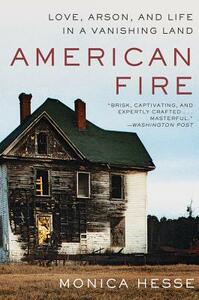Take a photo of a barcode or cover
I loved the idea of this book, but there were a few things that I wish would’ve had more or less focus as major topics. I would have liked to learn more about their failing businesses and Tonya’s history with her family and possible history of arson. I felt like I learned a little bit more about some of the people in the community than I needed to know. It was definitely an interesting story, and all the more interesting because it’s true.
This was a curiously fascinating read. Initially interesting because I'm familiar with the Eastern Shore and remember visiting during the fires; but Hesse's narrative uses the fires as a microcosm of poor, rural America and the ways that residents feel simultaneously trapped-in and loving-toward their homes.
Going to have to move this to dnf. I tried for a couple of hours, but I just felt it lacked focus and narrative qualities I like with nonfiction. It does feature some good descriptive writing, but I wasn't getting invested in the story.
2.5ish...quick read & intriguing premise, but ultimately falls flat as a true crime (non)thriller read. I enjoy the genre for its accounts of unspeakably evil horrors, and at end of the day, victimless arson is pretty weak sauce.
I enjoyed reading this, but I just expected it to be a bit more twisty.
An interesting book. I had never heard about these fires.
I enjoy true crime books, and this was refreshing one, in the sense that nobody died, was directly injured, or attacked. There was crime, but it was against--almost exclusively--abandoned property. As far as true crime books go, it's practically feel-good. Hesse manages to populate the story with well-drawn characters; even the most unlikable and enigmatic is given a relatively sympathetic portrayal.
I greatly enjoyed this book. It's compact; Hesse doesn't give in to the impulse of so many writers and include all the information she has. I've read a bunch of nonfiction where the author is clearly thinking, "I did a ton of research and dammit, I'm going to include it all!" (And, for some reason, the editor allowed it.) Her descriptions of the people and area involved are distinct enough that I could easily picture what was going on and fairly easily remember who was who--and there are a lot of people.
My one quibble is in the penultimate chapter, when Hesse ruminates on the symbolism of the acts of arson and the changing nature of the country. I felt that it wasn't really necessary--the book as a whole told that story without Hesse needing to show it in this way. Also, if it had to be included, why there? It felt more like an afterword or coda; not something to be thrown in before the story itself was finished.
I've read some reviews frustrated that Hesse doesn't show the "why" of the arson, but I didn't come away with that issue. Even without being able to interview Tonya, Hesse provides stories from others that give us insight into Tonya; she remains something of a mystery, but I could see how she and Charlie embarked on this spree.
American Fire is an engaging read. Even knowing the culprits, I remained engrossed, wondering how they would be brought to justice, learning the process of the investigation, seeing the relationship between Charlie and Tonya develop. I didn't want to put it down. Well done.
I greatly enjoyed this book. It's compact; Hesse doesn't give in to the impulse of so many writers and include all the information she has. I've read a bunch of nonfiction where the author is clearly thinking, "I did a ton of research and dammit, I'm going to include it all!" (And, for some reason, the editor allowed it.) Her descriptions of the people and area involved are distinct enough that I could easily picture what was going on and fairly easily remember who was who--and there are a lot of people.
My one quibble is in the penultimate chapter, when Hesse ruminates on the symbolism of the acts of arson and the changing nature of the country. I felt that it wasn't really necessary--the book as a whole told that story without Hesse needing to show it in this way. Also, if it had to be included, why there? It felt more like an afterword or coda; not something to be thrown in before the story itself was finished.
I've read some reviews frustrated that Hesse doesn't show the "why" of the arson, but I didn't come away with that issue. Even without being able to interview Tonya, Hesse provides stories from others that give us insight into Tonya; she remains something of a mystery, but I could see how she and Charlie embarked on this spree.
American Fire is an engaging read. Even knowing the culprits, I remained engrossed, wondering how they would be brought to justice, learning the process of the investigation, seeing the relationship between Charlie and Tonya develop. I didn't want to put it down. Well done.




